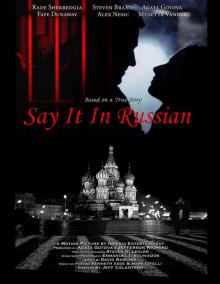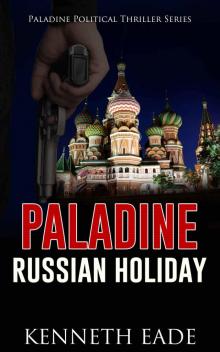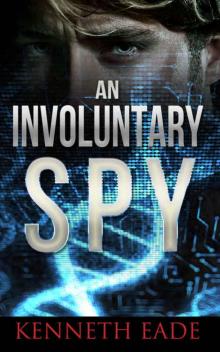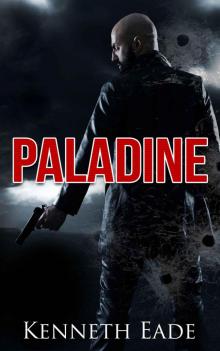- Home
- Kenneth Eade
Brent Marks Legal Thriller Series: Box Set Two Page 2
Brent Marks Legal Thriller Series: Box Set Two Read online
Page 2
* * *
Detective Daniel Salerno was an Italian American transplant from New York. He had known blacks from growing up in the city, and he didn’t care much for them. They were lazy, had chips on their shoulders, and thought the world owed them a free ride. And this one was a cop killer. He vowed to do whatever he could to make sure that he would see him executed. The young uniformed policeman stood next to him proudly as he interviewed William.
“William Thomas?”
“Yes.”
“I’m Detective Salerno from the Los Angeles Police Department. This is Officer Pike. You are under arrest for the murder of Officer David Shermer.”
William couldn’t believe what he was hearing. It was like he was in the middle of a nightmare over which he had no control.
“Murder?” he choked. “No, no, no…”
Salerno read from a card in his hand. “This interview pertains to criminal misconduct,” he read in a monotone, computer-like voice. “Therefore, I am going to advise you of your Miranda rights. You have the right to remain silent. Do you understand?”
“I know that.”
“Do you understand?”
“Yes.”
“Anything you say may be used against you in court. Do you understand?”
“Yes.”
“You have the right to the presence of an attorney before and during any questioning. Do you understand?”
“I want to call my attorney, now.”
Salerno glared at William.
“Please let me finish the admonition; then you can call your attorney. You have the right to the presence of an attorney before and during any questioning. Do you understand?”
“Yes.”
“If you cannot afford an attorney, one will be appointed for you, free of charge, before any questioning, if you want. Do you understand?”
“I understand.”
“Do you want to talk about what happened?”
“Not to you. I want my lawyer.”
Salerno turned to leave.
“Wait!”
“Yes?” He pivoted at the doorway.
“Can I see my wife?”
“This hospital is not equipped to handle prisoners. When your doctor OKs your transfer to County Jail, she can visit you per the visitor’s schedule.”
Salerno was gone. William’s head was spinning so fast, he had forgotten to ask about the restraints. He tried to move his arms as he called out, “What about these restraints?”
The question was either not heard or it fell on deaf ears.
CHAPTER THREE
Brent Marks didn’t take many criminal defense cases these days, especially from Los Angeles, but when he got the call from William Thomas, he made an exception and decided to consider it. William was a colleague that Brent had met during a securities fraud case. Ten years his junior, William had put up a great fight, all the way through the trial. He was a good lawyer, and through the years they had become friends.
The ride from Santa Barbara to the San Fernando Valley was not so bad in the afternoon, but it would be hell coming back, up until about 8 o’clock. As he watched the headlights of the cars inching their way toward him in slow motion on the northbound side of the 101 freeway, he thought of how he had commuted to law school in downtown L.A. for three years, and pondered how people wasted so much of their lives driving two or three hours to work and two or three hours back, day after day, year after year. It made him feel especially grateful that he lived in Santa Barbara, and only five minutes away from his office. He pulled into Olive View Medical Center in Sylmar. A few minutes later he was meeting with his old friend and potential new client.
Brent showed his bar card and ID to the officer on guard and told him that he needed to have a confidential discussion with his client. Then he walked in.
“William?”
The man in the hospital bed was not the big, strong, strapping man with the million dollar smile whom Brent had always known. This was a man in pieces.
“Brent, thank you so much for coming.”
“You look pretty busted up here, William.”
“Yeah. Six broken ribs, a broken knee…”
“And your face looks like you took on Mike Tyson, Evander Holyfield and Floyd Merriweather all at the same time.”
“I’m in deep shit, man.”
“That’s why I’m here. Tell me what happened.”
The TV droned in the background. Eyewitness News has just learned that a video of last week’s shooting of a Metro Division LAPD officer has been released to You Tube, where it has already received over 3 million hits…
“Brent, listen!”
Brent grabbed the remote control and turned up the volume. The video was disjointed, about 30 seconds long, and looked like it had been pieced together. It showed William wrestling on the ground with a uniformed police officer.
“Where did this video come from?” Brent asked.
“I don’t know. TJ had on Google glasses. Maybe he took it.”
“That would explain why it’s so short.”
The name of the suspect, a black man who appears to be in his thirties, is being withheld by police pending investigation…
“Listen to them, Brent. If you’re black, you’ll always be referred to as a ‘black man,’ never just a ‘man.’ If there’s no black man involved, they never say ‘a white man’ or ‘two white men.’ They just say ‘two men.’”
“It’s Jim Crow, all over again.”
“Brent, that policeman stopped me for nothing. And even after he stopped me, he should have seen who I was. But he didn’t see a human being. He didn’t see a man with hopes and dreams, with disappointments and accomplishments. All he saw in front of him was just another nigger.”
Brent knew that William’s case emphasized the black and white line that had been drawn between police and people of color in the United States. Police organizations followed a paramilitary structure and protocol, and their members had all been trained in a military fashion. Through years of desensitization, the public had come to accept the “us” or “them” mentality, and had looked the other way to violence on its own soil in the name of “safety,” especially after the war on terror was announced after September 11, 2001. Just as the military in war objectify and dehumanize the enemy, the enemy in the war on the streets of America had a face, and it was not white.
William recounted events that transpired upon leaving the stadium, up until the point when he was on the ground.
“After that, it’s a blank.”
“Whose hand was the gun in when it went off?”
“I don’t know.”
“Who squeezed the trigger?”
“I don’t know.”
“'I don’t know' doesn’t set very well for your defense, William.”
“That’s just it. I don’t know who shot the gun – him or me – it just went off. I don’t remember anything. I’m no expert, Brent, but it doesn’t look too good for me, does it?”
“No, it doesn’t.”
“Will you take my case?”
“Yes, but we have to formulate some kind of theory of defense.”
“Brent?”
“Yes?”
“You’re the criminal defense guy, not me. Can it be self-defense when you shoot someone else – not the guy you were defending yourself from?”
“That’s something I don’t know, William. I have to find out.”
CHAPTER FOUR
Los Angeles Police Department Chief Charles Penwald addressed a crowd of reporters inside the press room in the sleek glass and concrete headquarters of the LAPD. In back of him was a blue curtain, imprinted with LAPD logos, which could have served as a backdrop for some red carpet Hollywood event.
“We have a suspect in custody in the shooting of Metro Division Police Officer David Shermer,” he read from a prepared statement, matter-of-factly.
“As with all officer-involved shootings, LAPD Specialized Force Investigation Division respo
nded to preserve and collect evidence, and interview witnesses to the shooting.
“As you know, portions of this incident were caught on video. I have reviewed the video, and it is clear to me that the other officer’s gun was grabbed by the suspect, who discharged the weapon, fatally injuring Officer Shermer."
That should make it easy to pick a jury, thought Brent.
“Photos of the officer’s service weapon appear on my right. As you can see, the slide is partially engaged and a second round has been partially ejected and has fouled the firing chamber. This is indicative of force being used on the weapon.
“We will, of course, be conducting an extensive investigation…”
Of course.
“Can you identify the suspect?” asked a female reporter from the second row of the packed room.
“We cannot identify the suspect at this time, as our investigation is continuing. But we have made an arrest and the District Attorney will announce the identity of the suspect at the appropriate time.”
“Don’t you think this shooting indicates a racist pattern, and are you covering that issue in your investigation?” asked a male voice from the background.
“It is true that the suspect is African American, but I can assure you that the Los Angeles Police Department selects and trains its officers carefully and we do not tolerate racial inequality in any respect.”
Brent picked up the remote control and switched off the television in his living room. He rarely watched it, but wanted to keep up to date on the latest that was happening on the investigation, which seemed to be progressing at lightning speed. His cat, Calico, jumped up on the couch with him and started to purr.
“I know what you want,” said Brent, as he reached for the bag of cat treats on the coffee table. Calico began a “catlong rub” from whiskers to tail against Brent’s face, and her snaky tail tickled his nose. He opened the bag, which emanated the pungent smell of dried fish.
“Yeesh!”
Once Brent had fetched the treat out of the bag and given it to the cat, her display of affection immediately ceased and she jumped off the couch. She knew the rule was only one treat at a time.
Brent’s cell phone rang. The only thing he liked less than talking on the phone was the ridiculous electronic musical ringers. He didn’t have the time or the patience to sit with his phone and go through what seemed like hundreds of tunes to pick the perfect ringer, so he opted for the default one. Why can’t they just make a phone that rings like a phone?
“Oh hi, Angie. I was just going to call you.”
“Really? When?”
“Very funny. I’m pulling a night shift tonight.”
“New case?”
“Yeah.”
“What is it?”
“Have you seen the news lately?”
“Not the police shooting?”
“Yup. I’m meeting Jack in about a half an hour.”
“Couldn’t you do it after dinner?”
“We’re working through dinner.”
“I’m sure you would have liked it at my place better.”
“I always do.”
* * *
When Brent walked into Sonny’s Bar and Grill on State Street in downtown Santa Barbara, he knew it was the worst place to have a meeting on a Friday night. The bar was packed with partiers, all set to leave their inhibitions (and their sobriety) behind. It smelled like stale beer and wet wood, and the ample sound system belted out AC/DC screaming “Dirty Deeds Done Dirt Cheap.”
The only thing out of place at the bar was Jack Ruder. He sat among the after-work crowd who were in jeans or various other stages of undress, oblivious to the fact that he was an alien. Even the executives straight out of the boardrooms and the banks had the sense to chuck their ties and leave their jackets in the car. But there was Jack, in a crisp suit that looked like he had just taken it from the dry cleaners. He always had that stiff, cop-type look, even when he had a beer in his hand. Brent supposed it came from a lifetime career with the FBI before he retired. Now Jack spent his working days (and a great deal of his nights) as a private eye.
“Hey Jack, great place for a meeting!” yelled Brent, in competition with AC/DC and a hundred voices each competing to rise above the collective volume, as he approached Jack and reached for his hand.
“Yeah, I thought we should meet in a quiet place where we could talk,” Jack screamed back as he completed the shake.
“So what do you think? You want in?”
“Ex-FBI agent defends cop-killer? Why not? My reputation with local law enforcement could use a boost.”
“I knew you couldn’t resist this one.”
Brent ordered a Corona and a burger from the bartender.
“What’s first?” asked Jack.
“I’m going to talk to the buddies who were with William. You try to talk to the cop. I want to know as much as we can as soon as we can in case they don’t let William out on bail.”
“But he’s a local attorney with no criminal history; he’s not a flight risk.”
“Tell that to the judge who’s running for re-election on a tough on crime platform. I can’t see him getting out before trial.”
“There’s something that doesn’t make sense to me about this case already,” said Jack.
“What?”
“What were two officers from Metro Division assigned to North Hollywood doing patrolling Sherman Oaks alone on a Saturday night?”
CHAPTER FIVE
Timothy Jones (or “TJ” as his friends called him) was a tech geek. A computer whiz, he handled a major portion of San Fernando Valley small business’s computer needs. His home was an upscale south of Ventura Boulevard spread in Encino in a neighborhood that screamed “well to do.” Upon being welcomed in by TJ’s wife, a lovely slender lady with chocolate complexion, Brent looked around the place and could see that it was well equipped with every gadget imaginable. There was a bigger-than-big-screen TV in the living room with stacks of electronic boxes alongside it, including cable, TIVO, a home security system, and TV Internet. TJ’s wife directed Brent to his home office, a den filled with computers and TV monitors and packed with electronic contraptions.
“Honey, this is Brent Marks, William’s lawyer.”
“Come on in, Brent,” TJ said as he rotated his cockpit-style Recaro chair away from the larger- than-life trio of computer monitors and stood to greet Brent. He was a big man, slightly overweight, with a pleasant smile, a firm grip, and a scratchy voice.
Brent took a seat in the leather couch on the opposite wall.
“You’ve got a lot of toys here.”
“When you’re in the IT business, it’s an occupational prerequisite,” said TJ. “Plus they’re fun to play with.”
“Tell me about the video you took.”
“Well, I almost forgot I had those glasses on, because I was so scared.”
“Can I see them?”
“Sure,” TJ said, as he picked up a pair of regular-looking brown plastic-rim glasses, with thick sides and handed them to Brent.
“I designed the frames to hide the device. If you look on the right side, you can see the mechanism.”
“Where?” Brent asked as he turned the glasses around in his hands.
“Right here,” said TJ, pointing to a small rectangular implement that appeared to have a clear plastic lens.
“And how do you take pictures?”
“You just wink. I’ll show you.”
Brent handed the glasses to TJ, who put them on, looked at Brent, and winked.
“And a video?”
“I just say, ‘Okay glass, record a video.’ The default videos are ten seconds long. To make them longer, I have to use the control pad.”
“Which you couldn’t do.”
“Not with my hands cuffed. So I took a succession of ten second videos and cut all the good ones together.”
“What did you do with the bad ones?”
“Oh, I still have them, but they didn’t
make the final cut.”
“Why not?”
“They were mostly too dark, not enough light. Couldn’t make out anything that was going on.”
TJ put the video on the big screen and they watched it together.
“This is where William pushed the gun out of the way.”
“You don’t think he was trying to grab the gun away from the officer?”
“Well, maybe. Man, what would you do? That guy was going to kill him for sure. He was coked up with testosterone and pissed off that William wouldn’t let him push him around with his stupid stick. All he saw was black, and I don’t think that’s his favorite color, if you know what I mean.”
“I do. Tell me what you saw.”
“After William pushed the stick away, that crazy cop broke his knee cap with the club and William fell. Then he jumped on him, stuck his gun in his face and said, “You’re gonna die, nigger. Your momma won’t even recognize you at your funeral.”
“But you didn’t get that all on video?”
“Unfortunately not. I just kept telling the glass to record. There’s a gap between every ten second sequence.”
“Can I have a copy of all the original footage?”
“Sure.”
“Did you also give the police the original?”
“No, they just asked for ‘the video’ so I gave them the final cut. Are you going to call us to testify?”
“If it goes to trial. Only one problem.”
“What?”
“You guys were both drunk.”
“Believe me, Brent. You see something like that, and it sobers you up, right quick.”

 Brent Marks Legal Thriller Series: Box Set One
Brent Marks Legal Thriller Series: Box Set One Brent Marks Legal Thriller Series: Box Set Two
Brent Marks Legal Thriller Series: Box Set Two Say it in Russian
Say it in Russian Political Thriller: RUSSIAN HOLIDAY, an American Assassin story
Political Thriller: RUSSIAN HOLIDAY, an American Assassin story Spy Thriller: To Russia for Love: An Espionage and Pulp Fiction Political Thriller
Spy Thriller: To Russia for Love: An Espionage and Pulp Fiction Political Thriller Spy Thriller: An Involuntary Spy: An espionage thriller
Spy Thriller: An Involuntary Spy: An espionage thriller Traffick Stop, an American Assassin's Story (Paladine Political Thriller Series Book 3)
Traffick Stop, an American Assassin's Story (Paladine Political Thriller Series Book 3) Paladine
Paladine